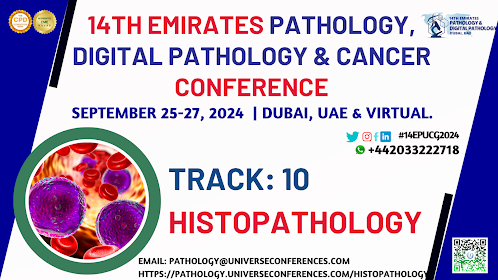Track 11: Cancer Cytopathology
What types of cytology?
Cytology
encompasses various specialized fields and techniques tailored to different
areas of study and medical practice. Here are some common types of cytology:
Diagnostic Cytology: This involves examining cells obtained from different body
tissues or fluids to diagnose diseases, such as cancer, infections, or
inflammatory conditions. It's often used in conjunction with histology (the
study of tissues) to provide a comprehensive diagnosis.
Gynecologic Cytology: This branch focuses on examining cells collected from the
female reproductive system, primarily the cervix, for the early detection of
cervical cancer and other abnormalities. Pap smears are a common example of
gynecologic cytology used for cervical cancer screening.
Non-Gynecologic Cytology: This includes the examination of cells obtained from
sites other than the female reproductive system. It encompasses various body
fluids and organs such as the respiratory tract (sputum cytology), thyroid
gland (fine needle aspiration), breast (fine needle aspiration or nipple
discharge cytology), and other tissues.
Fine Needle Aspiration (FNA) Cytology: FNA cytology involves using a thin
needle to extract cells from a suspicious mass or lesion for examination under
a microscope. It's commonly used to diagnose tumors and determine if they are
benign or malignant.
Fluid Cytology: This involves examining cells present in body fluids such as
cerebrospinal fluid (CSF), pleural fluid, peritoneal fluid, and synovial fluid.
Fluid cytology aids in diagnosing conditions such as infections, inflammation,
and cancer metastasis.
Urine Cytology: Urinary cytology involves examining cells present in urine
samples, primarily for detecting urinary tract cancers such as bladder cancer.
It's a non-invasive method used for screening and monitoring cancer
progression.
Immunocytochemistry (ICC): ICC is a specialized technique that uses antibodies
to detect specific proteins within cells. It's commonly employed in cytology to
identify cell types and characterize diseases, particularly in cancer diagnosis
and research.
Molecular Cytology: This field focuses on studying the molecular composition
and genetic characteristics of cells. Techniques such as fluorescence in situ
hybridization (FISH) and polymerase chain reaction (PCR) are used to analyze
DNA, RNA, and other molecules within cells.
These are some of the major types of cytology practiced in medical and research
settings. Each type plays a vital role in diagnosing diseases, monitoring
treatment responses, and advancing our understanding of cellular biology and
pathology.
What is exfoliative cytology?
Exfoliates cytology is a branch of cytology in which the pathologist analyses cells that have either been naturally “shed” by the patient’s body or that have been actively scraped or brushed (exfoliated) from the tissue’s surface.
Examples of manual tissue brushing or
scraping used in exfoliative cytology include:
Gynecological
samples: The most popular form of exfoliative cytology is a Pap smear, which
involves removing cells from your cervix with a swab.
SUB TRACK:
Cytopathology, tissues, disease, Papanicolaou test, cytopathologist, cystoscopy, Medicine, laboratory, body tissue, diagnostic, native tissue, Cytologic Technical advances, abnormal tissue, esophagus, stomach, duodenum, small intestine, brush cytology, endoscopic ultrasound, cervical cancer, diagnosis of cancer, Cytopathologic, microscope slide, cytocentrifugation. Cancer.
Call for Paper/abstract/case study: https://pathology.universeconferences.com/cancer-cytopathology/
Cytopathology
is the study of individual cells taken from tissues using specialized
diagnostic techniques in order to pinpoint the cause and type of a disease.
Cell
samples may be collected throughout routine diagnostic procedures including
bronchoscopy and cystoscopy. Certain techniques, such as the Papanicolaou test,
commonly known as the Pap test or fine-needle aspiration, can be used to
harvest cells from specific locations for diagnosis.
Even
though analyzing a cell sample is typically a short process, doing so correctly
requires specialized knowledge in order to identify cells that could jeopardize
a patient, such as precancerous, cancerous, or infectious cells. This work is
performed by a competent cytopathologist, a physician who has undergone
additional training in the accurate analysis and interpretation of data
obtained from cytopathology tests.
During
a typical Pap test, cells are positioned on a glass slide, fixed, and stained
using a mixture of dyes. To look for anomalies in the cells, such as
morphological or nuclear feature changes, light microscopy is performed.
Cell
samples are deposited in a vial of preservative for examination in the more
current automated liquid Pap test. This screening method has proven to be more
accurate at diagnosing the issue when compared to a traditional Pap test.
Cytopathology association Cytology
Associates of Dayton, Healthgrades Cytopathology, Clinical
Pathology Associates Cytology, Associates
of Dayton British, Association for Cytopathology Resources, British
Association for Cytopathology, Cytopathology
Canadian Association of Pathologists,
Cytopathology Society European Federation of Cytology Societies, State/Regional
Cytology Societies, Papanicolaou
Society of Cytopathology, American
Society of Cytopathology, Malaysian society of cytology, HONG
KONG SOCIETY OF CYTOLOGY, Japanese
Society of Clinical Cytology, Papanicolaou
Society of Cytopathology, The
Canadian Society of Cytopathology, American
Society of Cytopathology, National
Societies Of Cytology Worldwide
Important Information:
Conference Name: 14th Emirates Pathology, Digital Pathology & Cancer
Conference
Short Name: 14EPUCG2024
Dates: September 25-27, 2024
Venue: Holiday Inn Dubai, UAE & Online
Email: pathology@universeconferences.com
Visit: https://pathology.universeconferences.com/
Submit here: https://pathology.universeconferences.com/submit-abstract/
Register here: https://pathology.universeconferences.com/registration/
Online Registration here: https://pathology.universeconferences.com/virtual-registration/
Call Us: +12073070027
WhatsApp us at https://wa.me/442033222718?text=



.png)
Comments
Post a Comment